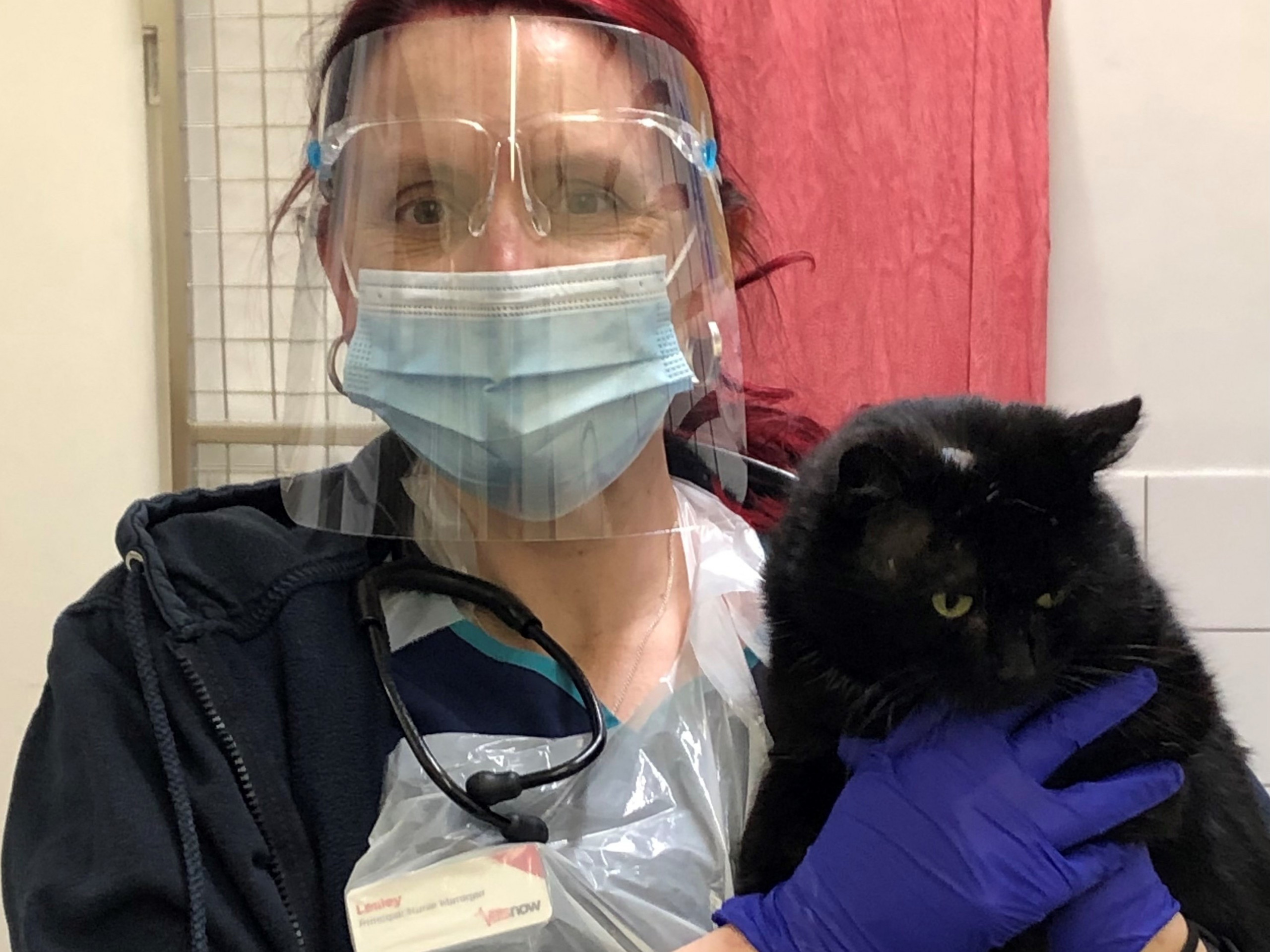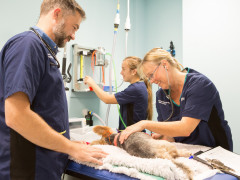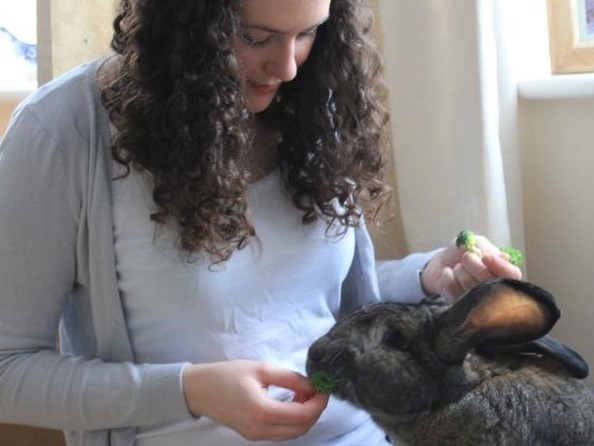Two years after vet nurse’s tragic death, Lesley and Sammy share their stories
For countless veterinary professionals, she was a shining light and a source of inspiration.
Louise O’Dwyer, Vets Now’s clinical support manager, didn’t just help those she worked with closely. Her lectures, practical guidebooks and journal papers taught thousands more how to become better nurses.
Tragically Louise, one of the world’s leading ECC veterinary nurses, died suddenly in May 2019, aged just 45.
To celebrate her life and ensure her passion for education continued to positively impact the profession, Vets Now launched the Louise O’Dwyer Bursary later that year.
As applications open for this year’s bursary, we speak to the first two recipients of the £2000 award and find out about their nursing careers and how the bursary ensures Louise’s legacy lives on in the most fitting fashion.

Lesley Moore, 47, Principal Nurse Manager Macclesfield
Tell us about your previous career and why you decided to become a veterinary nurse.
I’d initially thought about becoming a lawyer, but when I left university, I didn’t really know what I wanted to do. I went into banking, quickly got promoted, and latterly I was in corporate director roles in the City of London.
The stress levels were crazy, I was doing 80 or 90 hours a week, and I had no work-life balance. If I hadn’t thought about doing something else, I’m sure I’d have burned out. I’ve always loved animals, and when I was doing volunteering at a local cat sanctuary, it was suggested I might be good at veterinary nursing.
That must have been a big decision?
I was 36, earning a six-figure salary, and when you’re talking about giving all that up for four years to go back to university to do a degree, it’s a major move. But I needed to do it for my health. My dad had been really worried about me starting again, but within six months, he said I was much happier and was back to being me again.
How did you start nursing after graduating?
I quite quickly became head nurse and clinical coach at a general practice, and when my husband Steve and I moved to the Peak District in 2014, I worked in a mixed practice. I always liked the emergency side of things, and I’d started doing my ECC certificate when a roving nurse role across five clinics with Vets Now came up in late 2015, which seemed a perfect opportunity. Within eight months, I’d got the head nurse role at Macclesfield.
What’s the attraction of ECC with Vets Now?
I love the fast-moving nature of it, how every shift is different and that you never stop learning. You get to use your nursing skills to the maximum. You’re listened to by the vets, and our team at Macclesfield works like a well-oiled machine. I’m passionate about sharing my ECC knowledge with new staff and passing on what I know.
It sounds as though you always want to progress your skills and qualifications.
When I started my ECC cert while still in general practice, I also did my clinical coach training. Then, in my first couple of years with Vets Now, I decided to get into teaching. I’d started doing some lecturing, and in 2019 our clinic won an RCVS Knowledge award for work we’d been doing on general anaesthesia. I led that and did presentations at BSAVA and BVNA Congresses, followed by bite-sized roadshows.

Interested in a role at Vets Now?
Click the link below to find the right route for you
Current vacanciesHow did you get on with Louise, and what was she like?
I attended several of her lectures, but we first met properly in 2017. We bonded straight away, not just through work but also because we both loved vintage fashion, hair, and makeup. I introduced her to my hairdresser, and whenever we met, we’d talk about what clothing labels we were wearing.
As far as the work side went, she was just amazing. She was such a good speaker, and she always engaged everybody. You always went away from one of Louise’s lectures having learned something. She was so bubbly and had such a presence that when she walked into a room, everybody knew she was there. And if you ever had a complicated case, you knew you could turn to her for help. I was on a clinical shift when I heard she’d passed away. It was absolutely devastating.
How fitting is the bursary as Louise’s legacy, and how proud were you to win?
She made such an impression that there can scarcely be a nurse in the profession that doesn’t know who she is, and it’s wonderful that her passion for learning and sharing is continuing through this. When my name was read out as the winner at our Congress in 2019, it took ages to sink in – and then I could hardly walk to the stage in my high heels! Our then clinical director Amanda Boag knew Louise well, so we were both very emotional when she presented it to me. It’s such an honour and especially to be the first person to receive it.
And how are you using the bursary?
I want to use it to apply for the first part of the MSc in Veterinary Education at the Royal Veterinary College. I would have done it last year, but Covid-19 left me with some operational challenges in the clinic, so I’m in the process of applying for it this year and will hopefully start in September. That will be a 12 to 18-month post-grad certificate. I’m trying to branch out more into lecturing and teaching. I’ve been doing webinars and I’ve just become a lecturer for IVC Evidensia, putting an ECC programme together for their general practice nurses.
That sounds like a busy schedule. How do you find it?
It is, but that’s how I like it. I support eight or nine of my team in the clinic, trying to help train them as well as the wider nursing community. And I also volunteer as a Covid-19 vaccinator. Vets Now always help look after the work-life balance, and it’s so much better for me than being at a day practice, which I’d struggle to go back to. I’m used to studying and I’m very happy to keep on doing it, especially with this bursary being in Louise’s name.

Sammy Keetley, 35, Vet Nurse Lincoln
What’s your vet nursing background?
I didn’t start off doing this. My first degree was in wildlife conservation at Nottingham Trent University and, very early on, I realised I should have done vet nursing. But it wasn’t really the thing to do to change courses, so I stuck with it and went on to work for several charities in that sector, like the Woodland Trust. But when I was made redundant from one of them a few years ago, I took that as a spur to do what I had wanted all the time. So, I went back to university and studied vet nursing at Harper Adams, graduating in 2018.
When did you join Vets Now?
I only started with Vets Now just over a year ago, and I work part-time at weekends at the Lincoln clinic, having moved to the area with my boyfriend. I love working as part of the team there, and it helped that I knew a couple of the staff from a clinic I worked in on placement. The beauty of it is that there is always someone on hand to ask, and you feel very supported. And the weekend shifts work out perfectly for me as I’m back at university. I’m doing a Master’s degree in Clinical Animal Behaviour which I started last September.
Did you have any particular inspiration for moving into ECC medicine?
Lindsey Dodd, who has obviously done so much in veterinary nursing, was one of our lecturers, and she was so passionate about ECC. She certainly had an influence on making me think this was a path I might want to follow.
And what influence did Louise have on you?
I wasn’t lucky enough to meet her, but I saw her speak at Congress when I was in my first year as a student nurse, and she was just amazing. She was such an incredible public speaker. Some people can have all the knowledge in the world, but they don’t have a way of getting that across. That wasn’t the case with Louise, who was so engaging and inspiring that you couldn’t help but come away enthused. I still have her little green book with me all the time, and I regularly pull it out for a look when I’m on shift. It’s invaluable.
What made you apply for the bursary, and how surprised were you to be awarded it?
I had only been at Vets Now for a month or so when nominations opened last year. But I thought it would be a great opportunity to help continue my studies. Quite a few months had passed before I heard. It was just before Christmas when I got the call to say I’d been awarded it. It was such a shock but an absolute honour with it being in Louise’s name.
What do you plan to do with the bursary and how do you see your vet nurse future?
I’m going to apply to use it for my current degree, and I want to go on and do a PhD in Clinical Animal Behaviour after that if I can. I’m nowhere near the public speaker Louise was, of course, but eventually, I would like to pass on what I’m learning to other nurses.
Why the interest in that?
It has always been a fascination for me, and it’s looking at things like how clients can keep an animal calm on the way to us and how we can keep them calm in the clinic. It can be a stressful time for the pet, but if we can keep the dog or cat calm, it can often have an impact on anaesthesia or whether sedation may be required.
Is there anything you’ve learned already that you’ve been able to bring into the clinic?
There is some exciting work on brain laterality and how emotion shows up on one side of the face before the other. So, by looking at the left-hand side, you can get an indication of how the dog or cat might be about to react or what they might be about to do. If a pet was a bite risk, it could help give staff that crucial split second to take action and potentially avoid an injury.
Are you still able to interact with lots of animals?
Yes, I love the variety of cases you see at Vets Now, and the shift patterns work perfectly alongside studying. And I’ve just got a rescue dog, a Jack Russell-Chihuahua cross called Bert, who is keeping me busy at home.
